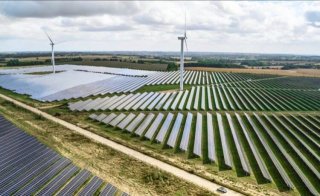- Collaboration with Wykes Engineering will develop one of the largest energy storage systems in the UK to harness solar and wind power using second-life EV batteries
- Battery Energy Storage System (BESS) will help decarbonise the National Grid and deal with peaks in demand; 30 second-life Jaguar I-PACE batteries can store 2.5MWh of energy – enough to power around 250 homes for a day*
- The reuse of vehicle batteries forms part of JLR’s ambition to adopt circular economy principles based on a Use Less, Use Longer, Use Again philosophy to limit the use of virgin materials
- Initiative supports JLR’s drive to achieve carbon net zero by 2039 across its supply chain, products, and operations under its Reimagine strategy
- Project represents a key R&D priority for Wykes Engineering Ltd
Dubai, United Arab Emirates, 24 August 2022: JLR has partnered with Wykes Engineering Ltd, a leader in the renewable energy sector, to develop one of the largest energy storage systems in the UK to harness solar and wind power using second-life Jaguar I-PACE batteries.
A single Wykes Engineering BESS utilises 30 second-life I-PACE batteries, and can store up to 2.5MWh of energy at full capacity. The batteries supplied have been taken from prototype and engineering test vehicles, and JLR aims to supply enough batteries to store a total of 7.5MWh of energy – enough to power 750 homes for a day – by the end of 2023. After this point more containers can be created to house additional second-life batteries removed from used production vehicles in the future.
Each BESS, which is linked to an advanced inverter to maximise efficiency and manage energy, is capable of supplying power direct to the National Grid during peak hours as well as drawing power out of the grid during off-peak hours to store for future use.
Battery storage systems like this are critical to decarbonising the Grid, as they can deal with rapid peaks in demand, and maximise solar and wind energy capture during sunny or windy conditions for use when needed.
As part of the technical collaboration, Wykes Engineering and JLR have achieved seamless integration, with no need for additional manufacturing steps or the removal of battery modules. The batteries are simply removed from the Jaguar I-PACE and slotted into racks in the containers on-site, helping to maximise the sustainability of the project.
The partnership represents an important step in JLR’s adoption of circular economy principles, part of the business’ strategy to achieve carbon net zero by 2039.
Second-life battery supply for stationary applications, like renewable energy storage, could exceed 200 gigawatt-hours per year by 2030, creating a global value over $30 billion**. JLR’s batteries are engineered to the highest standards and can therefore be deployed in low-energy situations once their health falls below the stringent requirements of an electric vehicle, which typically leaves a 70-80% residual capacity.
Reusing vehicle batteries will create new circular economy business models for JLR in energy storage and beyond. Once the battery health falls below the required level for these second-life use cases, JLR will recycle the batteries so that raw materials can be recovered for re-use as part of a true circular economy.
François Dossa, Executive Director, Strategy and Sustainability at JLR, said: “Our sustainability approach addresses the entire value chain of our vehicles, including circularity of EV batteries. Our EV batteries are engineered to the highest standards and this innovative project, in collaboration with Wykes Engineering, proves they can be safely reused for energy sector application to increase renewable energy opportunities. Using the 70-80% residual capacity in EV batteries, before being recycled, demonstrates full adoption of circularity principles.” “Working together with industry-leading partners, we are developing a complete EV ecosystem, from batteries to charging, supporting our net-zero transformation.”
Reuben Chorley, Trading Division Director at JLR, said: “We’re delighted to be working with Wykes Engineering on this pioneering project that will help unlock the true potential of renewable energy. Developing second-life battery projects like this is crucial to helping JLR adopt a new circular economy business model and drive us toward achieving carbon net zero by 2039.”
David Wykes, Managing Director of Wykes Engineering, said: “One of the major benefits of the system we’ve developed is that the containers are connected to the Grid in such a way that they can absorb solar energy ,that could otherwise be lost when the grid reaches capacity .This excess energy can now be stored in the second life I-PACE batteries and discharged later .This allows us to ‘overplant’ the solar park and maximise the amount of power we generate for the area of land we are using.”



